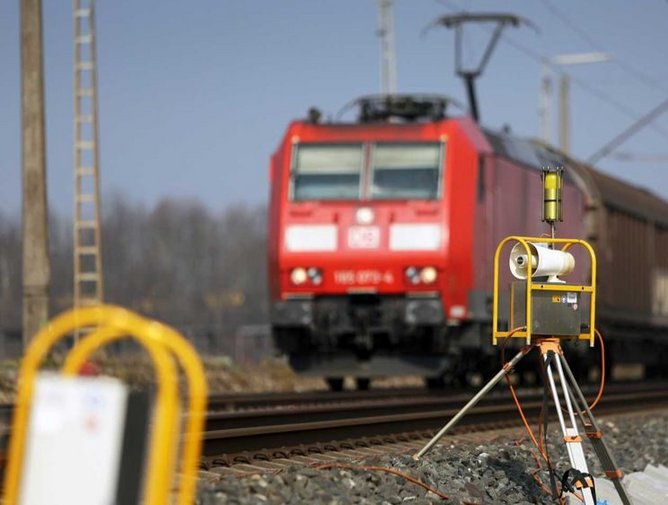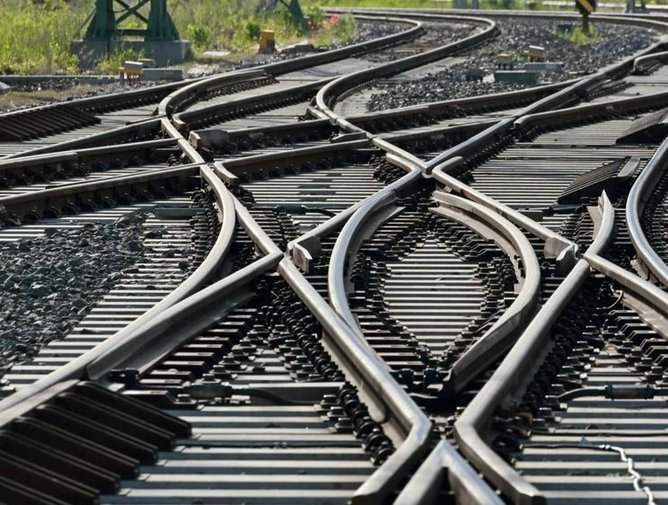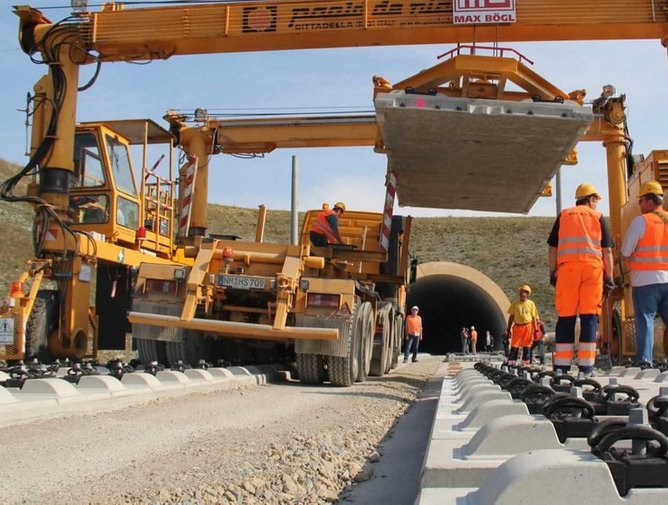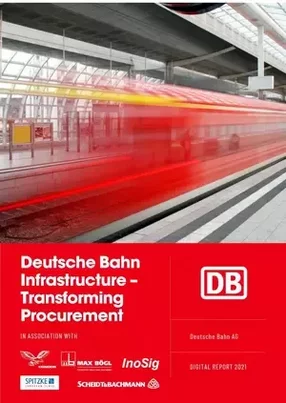Deutsche Bahn Infrastructure - Transforming Procurement
It’s fair to say that most supply chain executives had a metaphorical mountain to climb in 2020 and face an uphill task this year to achieve the ‘next normal’. The irony is not lost on Jan Grothe, Deutsche Bahn’s Senior Vice President of Procurement Infrastructure, who regularly climbs some of the world’s tallest peaks, and whose career path mirrors his passion.
“I love challenges. I love ambitious goals and I love mountaineering,” says Grothe from the rail and logistics giant’s Berlin headquarters. “So even above 7,000 meters, wherever in the world you are, it’s the same story. You have an ambitious goal, you need to prepare for this if you want to reach the top. This is the same in the mountains as it is in business.”
The DB Group is one of the world’s leading mobility and logistics companies, employing around 338,000 people around the globe. They design and operate the transport networks of the future, moving people and goods via an increasingly smart and sustainable system.
2021 will mark Grothe’s 20th year at Deutsche Bahn, where he has steadily risen through the ranks to scale new heights – both on a personal and company level – and overseen Deutsche Bahn’s digital transformation in procurement.
He had previous experience setting up platforms as a procurement consultant and was drafted into Deutsche Bahn to develop their own procurement platform.
“I originally thought that this would be a two-year project, and then I obviously stayed,” says Grothe. “That was because the people were great and they loved to have someone with them with an entrepreneurial approach – bringing things to an end, making decisions and leading the way. I had 50 people at that time for this project and we were very successful. So Deutsche Bahn actually was one of the first companies in Germany which had the full set of e-procurement systems, e-tender systems, and auction tools. And this was at the very beginning of my time there, so this really was state-of-the-art at that time.”
Always keen to take on a new challenge and push himself higher, it was not long before Grothe was moving beyond simply providing procurement platforms. He found himself responsible for two regions (North and West) and heading up the procurement infrastructure.
“We were procuring something like one billion euros,” he recalls. “That is when I really learned all about these operational processes and supply management in those regions. Shortly after this, I was asked to come back to the central functions and set up a supplier management and quality assurance team.
“That was quite a challenge because we hadn't had this before. The quality engineers usually didn't have anything to do with procurement and they weren't operating as a real team.”
The following challenge facing Grothe was huge. He was tasked with not only heading procurement strategy but also implementing IT systems – putting procurement at Deutsche Bahn through a literal digital transformation.
Seven years prior to Grothe joining, Deutsche Bahn was formed as a new legal entity in 1994 out of a merger of the eastern and western rail companies. The workforce stood at around 500,000 and in a drive to increase efficiency, that was halved by the time Grothe arrived. He says that had a significant impact on the culture of the business and was one of the many initial hurdles he faced.
In 2019 Grothe took over the procurement infrastructure department with almost 500 colleagues, facing a huge challenge as the German government recognized the importance of rail transport in its fight against climate change. The resulting cash injections (currently EU12 billion in 2021 and rising to EU15 billion each year to 2025) mean that a new strategy was developed and Grothe found himself responsible for a procurement budget larger than the GDP of Albania.
Needless to say, this was a game-changer. So where does the money go?
“Mainly, of course, in track and civil construction,” says Grothe. “So, for instance, bridges, stations, tunnels. We also invest heavily into the digitization of our track system, and that means mainly new signaling technology. That will allow us to increase capacity on the track by 20 per cent. And that's what we need to do if we want to transport passengers and goods on the biggest network in Europe. It is currently operating at 100 per cent capacity on the main corridors, so we need to increase efficiency.
“And that's why we are talking about introducing digital. Digitisation does not just affect signaling, we're talking about IoT sensors e.g. at switches to help monitor and maintain tracks – which will also ultimately reduce costs.”
SUBHEAD: DIGITAL TRANSFORMATION
While Grothe has propelled procurement at Deutsche Bahn along its digital transformation path, he admits that the pace of change within the industry, and slow uptake of digital, has been a hindrance – with some of their suppliers even struggling with basics such as email.
The railway industry does have a reputation for being slow on the uptake when it comes to digitization compared to some other industries, and that is partly down to safety concerns. However, suppliers have also proved slow at moving with the times.
“When we digitized the interface to the suppliers, a significant number of companies were actually not able to access the platforms or auctions,” he says. “Three per cent said they weren’t able to work with emails! I couldn’t believe it.”
Branding himself as an eternal optimist, Grothe focuses on the positive aspects of the Covid pandemic when it comes to accelerating the digital transformation that suppliers are finding themselves having to adopt, plus the fact that DB itself was well prepared for a move to the cloud.
“We introduced the digitized processes three years ago and also introduced flexible working at the same time. So, everyone was able to work wherever they wanted and all the processes were digitized. When the lockdown came, we were able to switch from one and a half days of working from home on average to five days a week, so it didn't affect our productivity at all. That was a good sign. We were well prepared.
“We decided as a company four years ago to migrate completely – and I mean completely – into the cloud. We finished that migration at the beginning of 2020, so we had no problems scaling up. Our reaction to the situation also saw us accelerate some new functions and new ways of working together.”
SUBHEAD: PRESSURE ON PRODUCTIVITY
It’s fair to say that Deutsche Bahn’s revenues have been significantly hit by the Covid-19 pandemic, as passenger numbers were decimated and remain low, while the company is still expected to provide a public service. Fortunately, DB’s worldwide operating freight and logistics arm, DB Schenker, stepped up and experienced higher demand when it came to delivering vital supplies – including Personal Protection Equipment (PPE).
“In the freight and logistics sector, DB Schenker is one of our subsidiaries and, in air freight, there was a huge increase in operations,” explains Grothe. “Even with the rail freight at DB Cargo, it was okay, and we did some new things. We set up a rail bridge from Asia to Europe which delivered a lot of essential masks and other PPE. There was a huge demand in Germany for this so we did pivot and freight was not as affected as passenger transport. Rail freight is more or less on the same level as before the Covid crisis.”
One thing is for sure. The economic fallout of the pandemic will put even greater pressure on CPOs to deliver under extreme budget restrictions and pressures as those companies that emerge look to tighten their belts. Does this inevitably mean that there will be pressure on suppliers to cut their prices? DB already enjoys a strong position when it comes to procurement thanks to its size and standing, so is there a danger that some suppliers simply will not be able to meet expectations in the ‘new normal’?
“Generally speaking, I think there's a huge pressure on productivity on both sides,” says Grothe. “So, on us but on the suppliers as well. We have to find solutions and new contracts to ensure we are in a better position, that's for sure.
“You know, sometimes we have to give something. We have a very stable company and people like to do business with us because we always pay – and in times like these, that is quite valuable. So, we have started initiatives to renegotiate contracts that will work for us and the suppliers.”
“This certainty is very valuable for a lot of suppliers right now and as some of our contracts last up to eight years, that can provide suppliers with perspective. With huge volumes, of course, they are in a position to lower (their) prices.
“On the other hand, the solution is innovation on both sides, so we do not just have to procure the same thing for a lower price. I would ask the suppliers to introduce better solutions for the same function.”
DB has roughly 20,000 suppliers, which creates its own challenges, and is one reason why Grothe prefers to work with long-term strategic partners. In the last few years, 80 per cent of DB’s business is procured from just 500 suppliers – whereas it was previously more than 3,000.
Grothe makes dealing with thousands of suppliers sound straightforward, and while it is clear he cannot handle them all personally, he does like to get hands-on and ensure everything is on track and meeting the high standards set by DB.
“I really like to see and meet personally from time to time,” he says. “Once a year, I do a whole day, spending time working with a key supplier. This may be on a construction site, on a safety issue, or in a planning office. This is most valuable as sometimes you don't get the full picture. It's always good to know how it really works.”
SUBHEAD: ACHIEVING WORLD-CLASS PROCUREMENT
This hands-on approach and attention to detail are key factors in Deutsche Bahn achieving World Class Procurement status. In order to do that Grothe had to first recognize that benchmarking was essential to measure success, adapt strategy and meet ambitions.
He started looking into existing measurement systems – not just in rail operators but the best procurement departments in the world – and came across the German consultancy company h&z. This kind of transparency is a leap of faith for any organization as you never know how highly you are going to be rated, but Grothe was convinced it was the right way forward and a starting point.
Marked out of 20 points on the h&z scale, and based on interviews with five subdivisions, anything between 11 and 15 is considered ‘professional’ while above that is ‘world-class’. Grothe, as well as the whole DB procurement team, was happy to achieve professional status from the first assessment in 2015 but was keen to improve.
“We looked at the processes, the IT systems, the supply management and the people, and then we worked on the biggest gaps that we could make improvements on,” he says.
“We did another assessment in 2016 and 2019 and it was great, good news for the whole team. There's still a way to go because this is a moving target. You compare yourself to others and they do not stand still, they keep improving, so we have to do that as well.”
In the latest assessment, DB ranked World Class in three out of the five categories, with the other two registering high scores in the Professional tier.
SUBHEAD: THE FUTURE
It is impossible to consider what the immediate future may hold without reflecting on 2020’s disruption. With so much turmoil and negative impact on revenue, it’s almost inevitable to see a return to ‘normal’ as being a significant achievement. And when you heard the numbers involved for a company like Deutsche Bahn, it’s easy to understand why a return to status quo would be a win.
“We expect to make a loss around six billion euros [for 2020] and another six billion euros over the next two years. So, this is something like 12 billion euros in losses compared to the plan we had in 2019. We will be quite happy if we get back to that level first and then talk about new plans,” says Grothe.
“But, we strongly believe that the number of passengers and commuters will increase rapidly by 2030. This is still our assumption, and that's why we invest heavily in our track and we invest heavily in our rolling stock.
“It will probably take us two years to get back where we started but we expect everything to increase as projected before.”
Grothe firmly believes that this is also an opportunity to learn and adapt, and to use Covid to push for even greater digitalization.
“There's an amazing energy in the room right now. Suppliers who have been slow to adapt to digital, we can push them right now. I expect this to boost productivity. We can use that energy and when the crisis is managed, we want to focus on what I call responsible procurement,” he says.
“This means corporate social responsibility (CSR) from us and our strategic suppliers.”
Grothe admits that he has personally invested a lot into DB’s culture because he wants to make procurement the place to be within the company. So whereas just 10 years ago, no one really wanted to work in the procurement department because it was mainly seen as boring – just writing orders all day – the culture has shifted.
“I think we as a procurement management team have already made this a great place to be,” Grothe concludes. “We are close to world-class and people are proud to work here.”




